

Personal Ophthalmic Diagnostic System incorporating iTEST. SeeChange Home. Smart skin: Electronics that stick and stretch like a temporary tattoo. 8/11/2011 | Liz Ahlberg, Physical Sciences Editor | 217-244-1073; eahlberg@illinois.edu CHAMPAIGN, Ill. — Engineers have developed a device platform that combines electronic components for sensing, medical diagnostics, communications and human-machine interfaces, all on an ultrathin skin-like patch that mounts directly onto the skin with the ease, flexibility and comfort of a temporary tattoo.
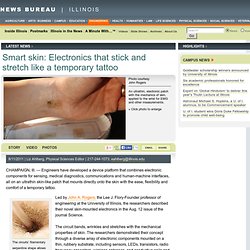
The circuits’ filamentary serpentine shape allows them to bend, twist, scrunch and stretch while maintaining functionality. | Photo courtesy John Rogers Led by John A. Rogers, the Lee J. Flory-Founder professor of engineering at the University of Illinois, the researchers described their novel skin-mounted electronics in the Aug. 12 issue of the journal Science. The circuit bends, wrinkles and stretches with the mechanical properties of skin. The patches are initially mounted on a thin sheet of water-soluble plastic, then laminated to the skin with water – just like applying a temporary tattoo.
Clothes that monitor your heart. Personalized Connected Health. One in Every Five Wearable Wireless Devices Set for Healthcare Deployment by 2017. London, United Kingdom - 20 Jun 2012 Small footprint, low-cost, low-power, and standardized wireless connectivity embedded in wearable devices will transform the lives and activities of millions of consumers and patients over the next five years as wearable wireless-enabled devices increasingly track an individual’s activity and condition.

A new wave of wearable devices are coming to market that will help track and share data from a range of activities and conditions. These devices will track the pace of someone’s daily run, recognize a fall that might have injured a senior, report the blood sugar level in a diabetic, and monitor the heart rate of a patient in hospital. Over the next five years, the market for wearable wireless devices will grow to 169.5 million devices in 2017, up from 20.77 million in 2011, a CAGR of 41%.
It is part of ABI Research’s Wireless Connectivity and Wireless Healthcare Research Services. Misfit Wearables. Ec.europa.eu/research/health/pdf/13th-european-health-forum-workshop-report_en.pdf. The Consumerization of Healthcare. The Consumerization of Healthcare - Orca Health Decide. The systemic change in US healthcare delivery has been called many things, but they all refer to one thing: the future of healthcare will be in the hands of the consumers.
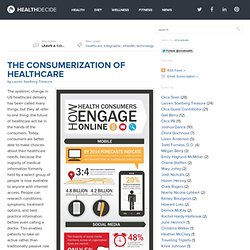
Today, consumers are better able to make choices about their healthcare needs, because the majority of medical information formerly held by a select group of people is now available to anyone with internet access. People can research conditions, symptoms, treatment options, and best practice information before even calling a doctor. This enables patients to take an active rather than traditionally passive role in their personal healthcare. As the roles continue to change, the future consumer-driven healthcare system will most likely see drastic changes in three main areas: Outcomes In a new dynamic of healthcare, the patient visit will increasingly be outcome-based. Technology The healthcare system will become increasingly reliant on technology to improve outcomes and cut costs while increasing coverage. Cost. Personalized Medicine Will Transform Healthcare - Healthcare - As healthcare providers incorporate deep analytics and advanced clinical decision support into everyday practice, they'll turn standardized medicine into personalized medicine. 11 Super Mobile Medical Apps (click image for larger view and for slideshow) Thought leaders in academic medicine have been pushing hospitals and medical practices to adhere more closely to evidence-based clinical guidelines, which some call standardized medicine.
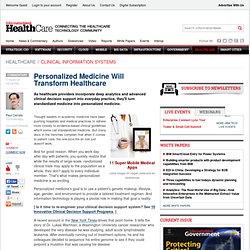
But many docs in the trenches complain that when it comes to patient care, the one-size-fits-all rule just doesn't work. And for good reason. Personalized medicine's goal is to use a patient's genetic makeup, lifestyle, age, gender, and environment to provide a tailored treatment regimen. . [ Is it time to re-engineer your clinical decision support system? A recent account in the New York Times drives that point home. That account highlights the promise of IT-enhanced genetic analysis. While success stories like Dr. More Insights. Is Personalized Medicine In Your Future? - Healthcare - Clinical. Proponents say the marriage of health IT and individualized therapy will revolutionize health care.
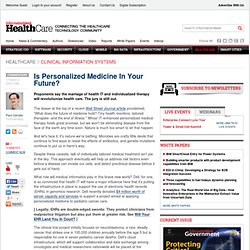
The jury is still out. The teaser at the top of a recent Wall Street Journal article proclaimed, "What does the future of medicine hold? The Future of Personalized Medicine. Massive Health + Home. We are proud to say that we have been acquired by a company that not only leads in consumer products, but is the leading company in consumer health.

They do hardware. They breathe design. They are FastCompany's second most innovative consumer tech company (beaten only by Apple—and we're coming for you, Apple). They are: Massive Health was a company born from a passion to make products that make being healthy as easy as using an iPhone. MedicalApps. AchieveMint. The Quantified-Self Business. The genius of Facebook—and one of the reasons it is worth more than $50 billion—is that it effortlessly collects huge volumes of information by offering people a place to socialize.
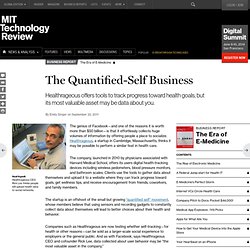
To Solve Our Health-Care Crisis, Home Treatment Needs A Makeover. Chronic disease is society's biggest health-care challenge.

Even if we do a good job preventing disease by helping people live healthier lives, it's inevitable that for at least the foreseeable future, conditions like heart disease, diabetes, and depression will be our society's most substantial health-related issues. The term "chronic" is used to describe conditions that are long lasting, so it shouldn't come as any surprise that they are incredibly expensive, both financially and in terms of quality of life. (See the U.S.